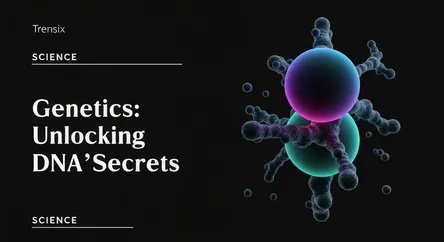Science
Genetics: Unlocking DNA's Secrets
What is it?
Genetics is the scientific study of genes, genetic variation, and heredity in living organisms. It's the branch of biology that examines how traits, such as eye color or susceptibility to disease, are passed from parents to their offspring. At its core, genetics focuses on DNA (deoxyribonucleic acid), the molecule that carries the instructional code for building and maintaining an organism. This 'blueprint of life' is organized into genes, which are specific segments of DNA. By studying how these genes function, interact, and evolve, scientists can understand the fundamental mechanisms that define every living thing.
Why is it trending?
Genetics is at the forefront of scientific innovation, driven by rapid technological advancements. Technologies like CRISPR gene editing and affordable, high-speed DNA sequencing have made it possible to read and even rewrite genetic code with incredible precision. This has fueled a surge in personalized medicine, ancestry services, and agricultural development. The popularity of direct-to-consumer DNA tests has brought genetics into the mainstream, allowing people to explore their heritage and potential health risks. The constant stream of discoveries linking genes to diseases like cancer and Alzheimer's keeps the topic in the news, promising a future of predictive and preventative healthcare.
How does it affect people?
Genetics has a profound and growing impact on everyday life. In healthcare, it enables personalized medicine, where treatments are tailored to a person's unique genetic profile, increasing effectiveness and reducing side effects. It's crucial for diagnosing inherited disorders and assessing an individual's risk for developing certain conditions. Beyond medicine, genetics can reveal deep ancestral roots and connect families. However, it also raises significant ethical and social questions regarding data privacy, genetic discrimination, and the potential consequences of altering human DNA. Understanding genetics empowers us to make informed health decisions and navigate the complex future of biological science.
